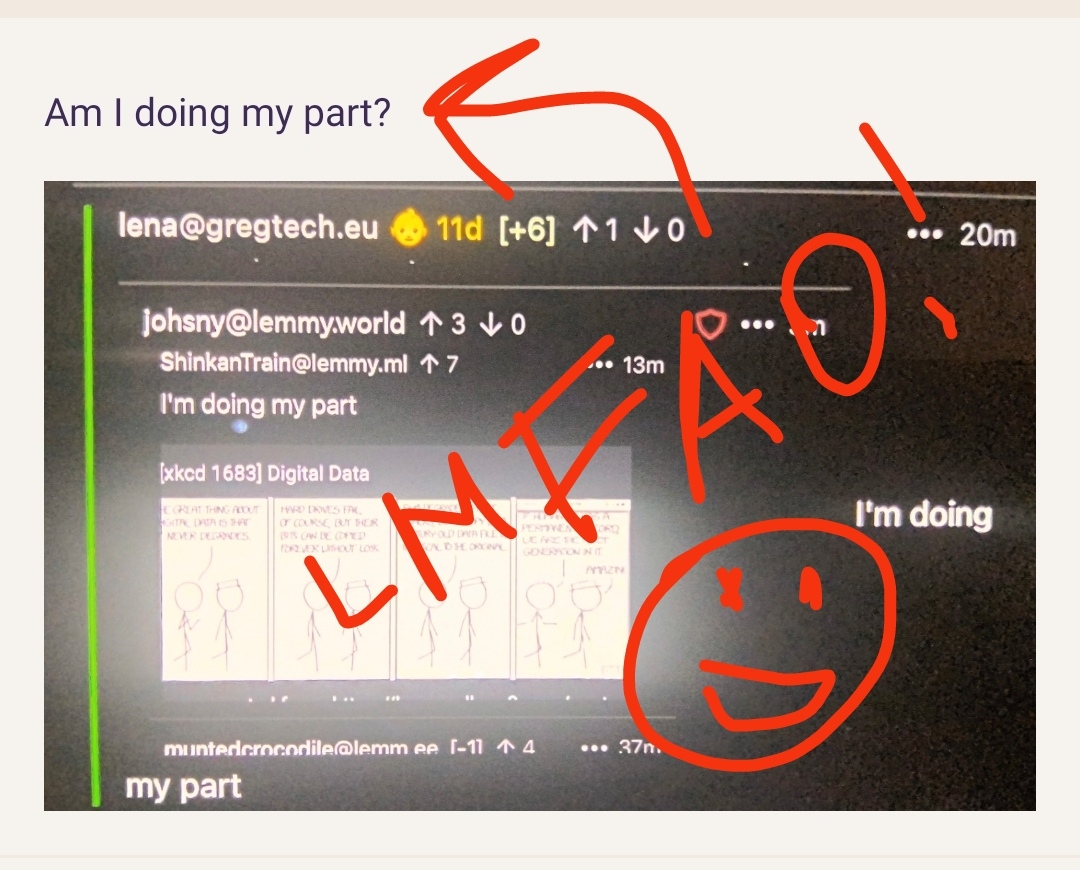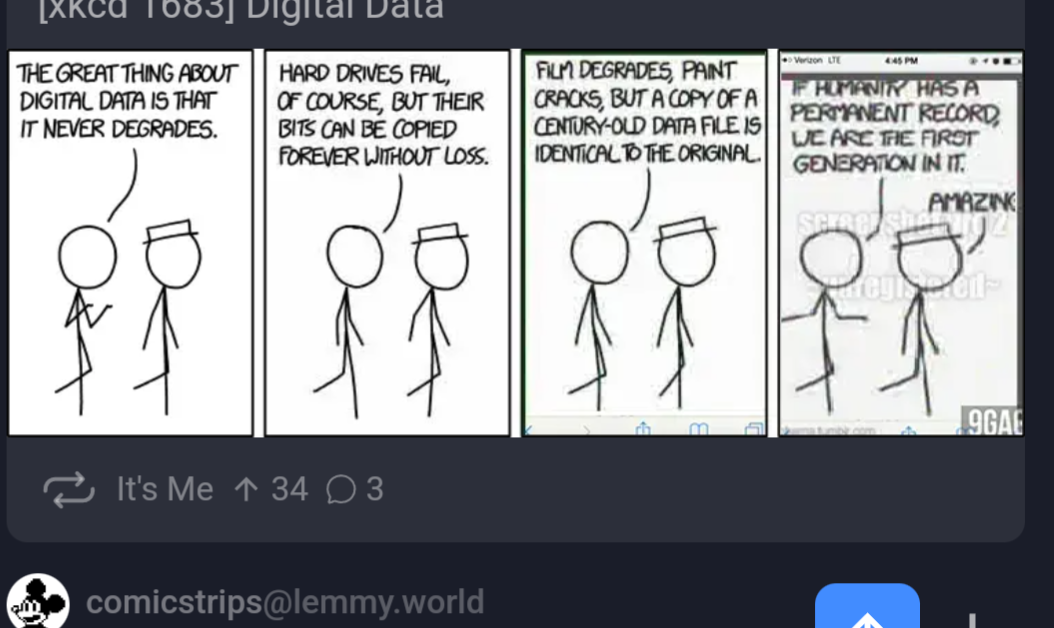- cross-posted to:
- [email protected]
- cross-posted to:
- [email protected]
cross-posted from: https://lemmy.dbzer0.com/post/36672698
Source: https://xkcd.com/1683/
Only downside is that only data that people care about right now is being saved. But what seems useless now might become valuable in the future. It’s hard to grasp how much data has been forgotten on some old computers, or some CDs, or websites that have gone dark.
I really hope the Internet Archive survive their lawsuits. They’re important not just for archival of websites (the Wayback Machine) but also of books, audio recordings, etc. There’s a large amount of old content that’s only archived at the Internet Archive.
I like how /u/gofsckyourself didn’t show up with a higher quality version.
I’ve always thought that argument only works as long as data is free or close to free. Once it incurs a cost, I think copies end up getting removed. I think it’s fundamentally flawed to say the internet will never forget.
The media on the internet will all eventually be behind a paywall. It seems like we’re heading in that direction.
Ironically this is original data we are viewing now.
Well it wasn’t even posted on your instance, so you’re already just viewing a thirdhand copy of it
Despite that its still the same actual bits of data
It’s identical, but it’s not the same bits
deleted by creator
Heh, heh…
The Bits of Theseus
yes it is. all electrons are just the same one moving very fast.

 I’m doing my part
I’m doing my partAm I doing my part?

My eyes!! 😫
For sure you are!


 Hey check this cool meme out!
Hey check this cool meme out!
deleted by creator
Good luck finding the raw original video of anything these days. The amount of 3gp an rm files that used to float around compared to the reactionary emoji text bs you see today. Get off my lawn.
See, that’s why I started using JPEG-XL for long-term storage. Apart from being better in every aspect for lossless and near-lossless still images than any competitor, the generation loss even over 1000 lossy save and load cycles is negligible.
That really doesn’t matter when someone screenshots your JPEG-XL and posts it in a website that transcodes it to WEBP and adds a water mark.
Well, for thot pics, there’s always more jpeg. For everything else, there’s lossless data formats.
Even with jpeg, you only lose data each time it’s encoded. If you save the file instead of taking a screenshot, the quality remains the same.
That said, I don’t know if there’s a digital storage method widely used that will last longer than a book without some sort of active aspect to the storage (like copying the files to a new medium every now and then).
I think punch cards are one that can, but they aren’t used much anymore due to poor density and speed, plus being susceptible to literal bugs. It’s possible to encode digital information into carved rock, but that would also have density issues (higher density means less reliability because the amount of damage required to make it unreadable is lower).
I think there’s a good chance that a lot of the knowledge we have today could be lost entirely if civilization collapses to a certain degree just due to how we store it.
We have stone tablets from back when humans invebted written language. I vote we back up critical data using this method.
Yeah, though it has that issue with data density. The denser the data, the more likely it will become degraded from erosion or chipping.
Also if there’s a discontinuity between our civilization and a future one, the denser the data, the less likely any future civilization would discover it’s there, even if it still has enough integrity to be read.
I think there’s a good chance that a lot of the knowledge we have today could be lost entirely if civilization collapses to a certain degree just due to how we store it.
We do have some backups.
You’re right, the format’s integrity is only as good as the medium upon which it’s stored. Hard disks are really only good for a few decades if left untouched. Punchcards maybe a few thousand years if sealed up well.
The “active aspect” you mentioned is the key. There are file storage systems which employ regenerative error correction to achieve exactly this sort of desired outcome. I use one on my home server called ZFS. It was originally developed by Sun Microsystems and works great. The only catch is that there is a limit to the number of drives in your storage array which can fail before data becomes unrecoverable. So, you have to be constantly vigilant, and if a drive is starting to go, replace it before a potential worst case scenario of cascade failure.
Unfortunately, I don’t know of a way we could store something indefinitely without this kind of active monitoring and occasional TLC. If a sort of caretaker is required, this might be a good job for AI with real world robotic hooks - have it monitor the array and fabricate replacement drives for installation as needed.
One other possibility that just occurred to me is to encode it into living DNA along with better error correction mechanisms so it doesn’t mutate. Like thinking from a “leave data for future civilizations to find” perspective, though it could also be a decent long term passive(ish) archival. Maybe completely passive if a self-sustaining but isolated environment could be created for it.
Not great for data you want to keep but also actively use, though. Or data you want to be able to modify.
I’m doing my part

I love how unoriginal the human brain is sometimes. I had the same exact thing I was about to comment

Needs more jpeg.
About that… we could record someone’s every word and different people would read entirely different things into it. Consider how strangers have reacted to your own internet comments.
Ray Bradbury famously directly told people they were interpreting Fahrenheit 451 wrong while he was alive and they still didn’t believe it
Bradbury just complained that people were gonna stop buying his books. He gripes in multiple books that people dont read anymore since that’s how he made money.











